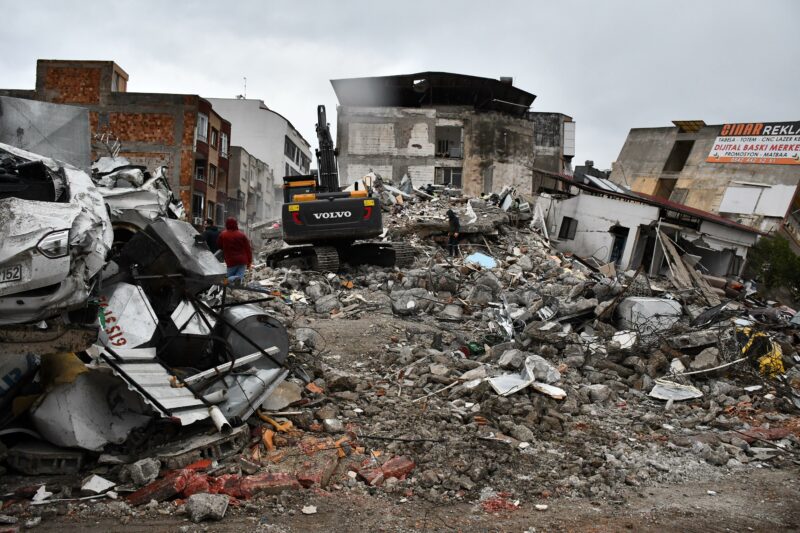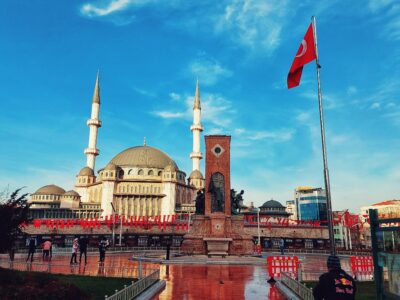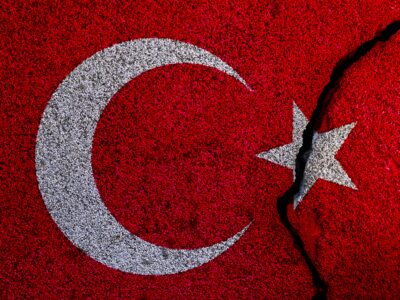
Image via Unsplash. Free to use.
March 6, marks one month since a deadly and devastating earthquake struck ten provinces in Turkey’s southeast. According to the most recent official data, the number of people who died, as a result, has reached 45,968, while over 200,000 buildings have been destroyed or seriously damaged. The actual numbers are projected to be much higher. One opposition politician questioned the credibility of state numbers citing the state’s shady track record of sharing data in crises, such as its failure to share an accurate number of COVID-19 infections at the start of the pandemic in 2020.
Anger against the state continues, reaching even the football stadiums. Meanwhile, revelations of corruption continue to rock people’s trust in state institutions and cause further fury. A recent journalist investigation revealed that the Turkish Red Crescent, a state-backed aid wing, opted for selling tents rather than distributing them for free in the aftermath of the earthquake. The arrest of some 230 people, mostly building contractors, has made little difference in public criticism and outcry, not when not a single official has announced their resignation or has taken the blame for what has been termed by the state as the “disaster of the century.” Instead, officials showered critics with accusations and threats. The latter featured prominently in statements by president Erdoğan himself since the first days of the earthquake. In his most recent address in the parliament on March 1, President Erdoğan stuck to the persistent narrative, that the state response was adequate and timely even if he publicly apologized for delays and asked for a blessing, during a visit to one of the earthquake-struck provinces, Adiyaman. A hashtag #helaletmiyorum (I do not bless you) quickly started trending on Twitter.
One man rule
In her recent piece for Foreign Policy, Gonul Tol wrote how President Erdoğan’s one-man rule over the two decades he has been in power, has not only weakened state institutions but also made the state dysfunctional. “Erdoğan, in his 20 years at the helm, has hollowed out the country’s institutions and placed incompetent loyalists in key positions to centralize power in his own hands. This made Erdoğan the strongest man in the country but left the state barely functioning,” wrote Tol.
The erosion of institutions over the years benefited the ruling party the most. Rather than accepting mistakes, a tradition of so-called enemy lists accused of all the ills and crises took shape. These scapegoats were academics, journalists, civil society activists, and politicians who faced blackmail, bogus criminal charges, arrests, and lengthy jail sentences. Bridled under the party’s control, independent media was sidelined and at times silenced, while the legislature, also managed by “incompetent loyalists,” delivered state-designed narratives to consolidate the image of a state and a leader capable of superman features. And yet, as the recent earthquake showed, the only supermen and superwomen were the people at large. The solidarity of the latter, the tireless work of journalists on the ground who refused to be silenced despite the pressure, and the ongoing threats leveled against the critics of the state, illustrated that power and fear won’t always work.
An earthquake cannot be dismissed or labeled as terrorist, or as an outcome of a plot conspired by Western powers. Nor can it be swept under the carpet.
Suddenly the ruling government has been exposed all at once — for corruption, negligence, inadequacy, absence of knowledge, professional skills, or capacity, and no matter how hard it has tried to pull itself together — whether through further measures of intimidation, threats or misinformation — the exposure is there and the tragedy Turkey witnessed on February 6 has shaken the country to its core.
Global Voices is continuing to cover the aftermath of the earthquake in Turkey and its many consequences, including its impact on the upcoming general elections and what lies ahead.
Stories about The splintering of Turkey
Turkey heads to election run-off on May 28
These elections also showed how the main opposition coalition underestimated the societal split and the priorities that mattered — nationalism, big infrastructure projects, identity, and security to name a few
In Turkey, will one man continue to rule them all? The May 14th elections hold the answer
The stakes are high, and there is a growing sense among the general public that if the current leadership stays in power, the country's future is grim and uncertain.
The rubble after Turkey's earthquake may have a disastrous environmental impact
Two months after the earthquake, officials are facing challenges over where to dump the waste and rubble from the destroyed buildings and roads and how to dispose of it.
The new normal after Turkey's earthquake: A TV host and comedian gives his take
The show, relies on daily issues and so it was not at all surprising the new episode that aired on Saturday was all about earthquake.
Former imam recites children's folk song in Kahramanmaras, Turkey
In an attempt to soothe the children but also the adults affected by the earthquake, Ömer Faruk Amca, decided to recite an old Turkish folk song from a mosque.
Silent no more: Criticism of the state's inadequate earthquake response reaches football stadiums in Turkey
The club organized the protest to commemorate all the children who died in the earthquake, with plans to donate the toys to displaced families who survived the disaster.
In Turkey telecommunications watchdog blocks access to popular website Ekşi Sözlük
On February 7, another popular social media platform, Twitter was briefly blocked by the authorities on similar grounds.
After Turkey's earthquake, a fireman adopts the cat he rescued from the rubble
The fire brigade from Mardin saved five people from under the rubble in Gaziantep. On the way back to Mardin, the team had a plus one, a cat named Wreck.
University students in Turkey are bearing the brunt of the earthquake
The latest criticism levelled against the state was because of its decision to open all state-run student dormitories to earthquake evacuees and switch to online education in the country's universities.
As another two earthquakes hit Turkey, anger continues to grow
Turks took it to Twitter calling on the state to send more tents while also questioning where the money that was raised since the last quake two weeks ago went
Meet the scapegoats of the earthquake in Turkey
While the state was searching for scapegoats, and focusing instead on face saving measures, Turks from all walks of life were busy mobilizing across the country.
Undertones in Turkey: Earthquakes fan the flames of election season
Erdoğan’s leadership may be on the line, with compounding accusations of corruption, economic mismanagement, and the slow and inadequate response to the earthquake.
Four-legged rescue workers do not go unnoticed in Turkey's search and rescue operations
Many of the search and rescue mission teams on the ground have relied on their canine assistants, who have been working tirelessly throughout the past week.
In Turkey, the state resorts to censorship majeure
Rocked by a devastating earthquake, citizens in Turkey now have to also deal with censorship measures imposed by the state amid an outcry of public criticism.
Turkey rocked by a series of devastating earthquakes
The aerial footage from the locations hit the hardest show destroyed residential buildings, hospitals, municipalities, and many other buildings, including Gaziantep Castle, which was more than 2000 years old.
















